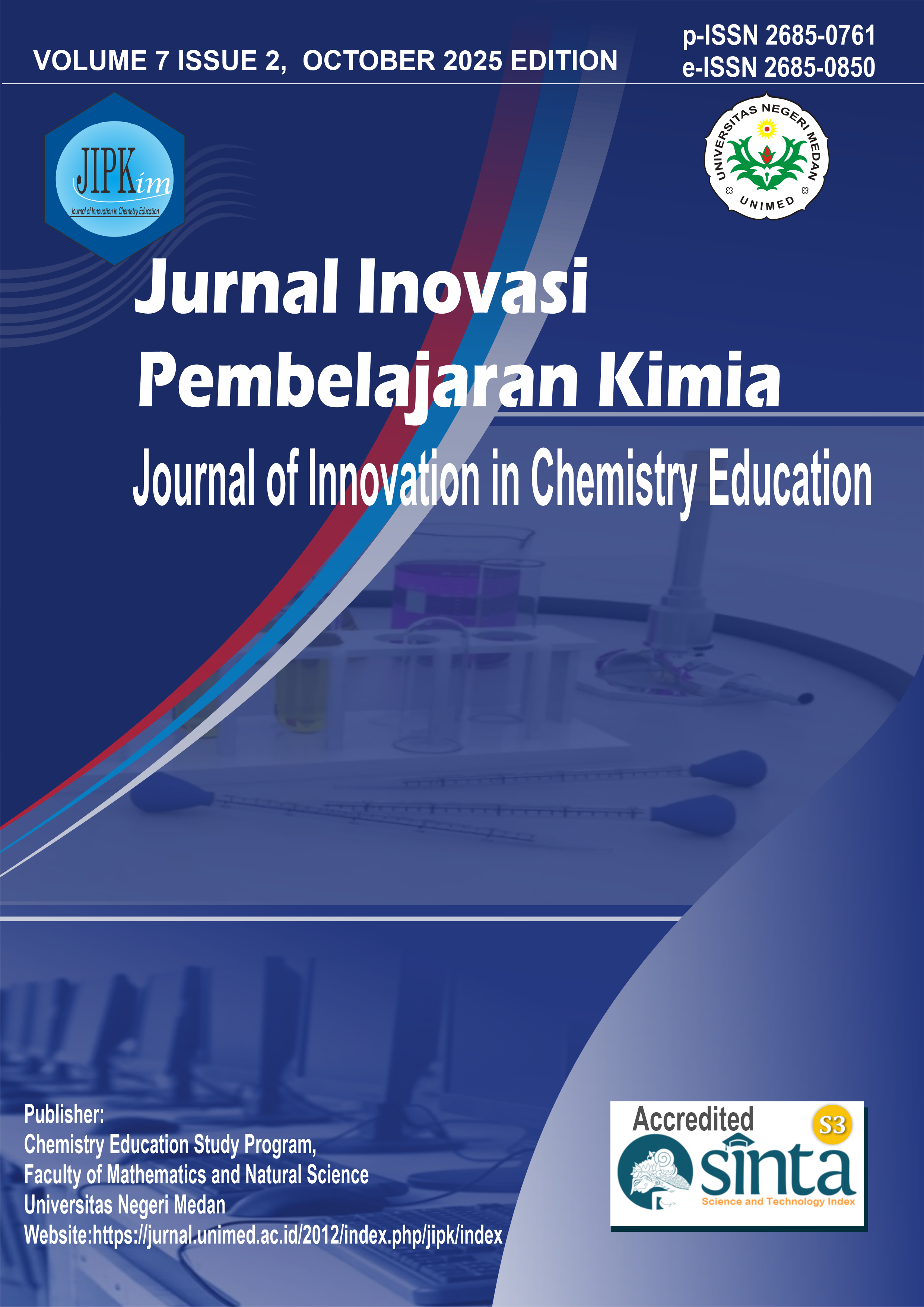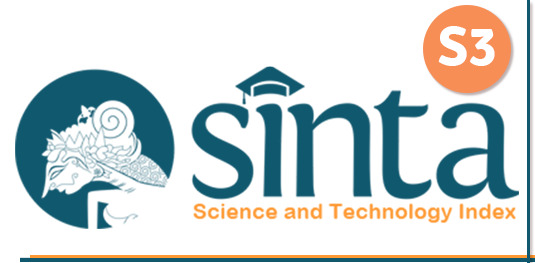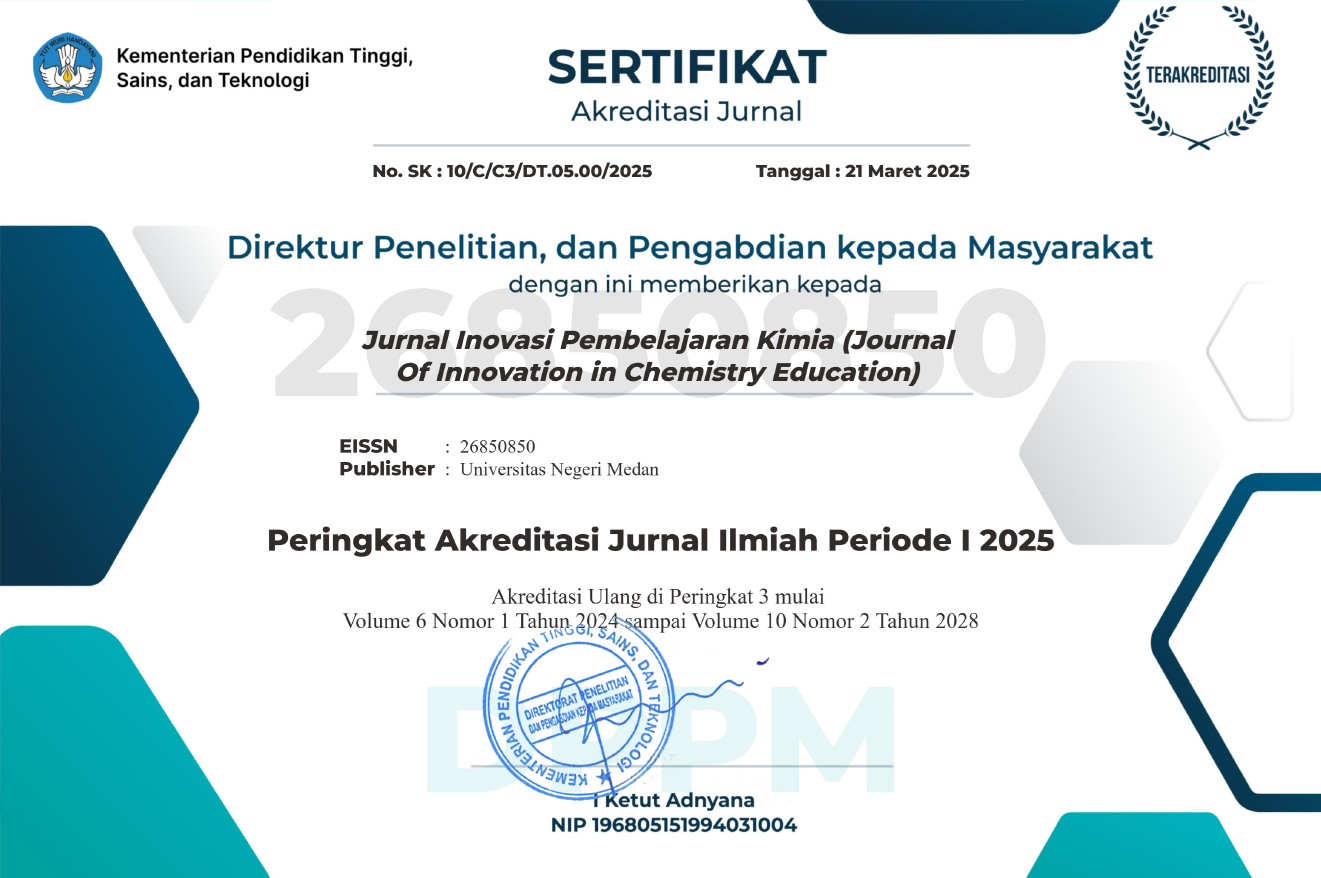The Relationship Between Collaborative Skills and Chemistry Learning Achievement
DOI:
https://doi.org/10.24114/jipk.v7i2.69105Keywords:
collaborative skills, learning achievement, multiple choice multiple answer, acid-base conceptAbstract
Abstract: This study investigates the relationship between students’ collaborative skills and their achievement in chemistry learning, particularly on the topic of acid–base concepts. Collaborative ability plays an essential role in supporting effective learning and knowledge construction, especially in cooperative classroom settings. The research involved 255 eleventh-grade students who completed both a collaborative skills questionnaire and a chemistry achievement test. The collaborative skills instrument consisted of 23 items covering 11 dimensions, while the achievement test assessed students’ understanding of acid–base concepts. Data were analyzed using Spearman’s correlation after confirming normality and identifying a non-linear relationship. The results revealed a positive and significant correlation between collaborative skills and learning achievement (r = 0.501; p < 0.001), with a determination coefficient of 25.1%. These findings indicate that students with stronger collaborative skills tend to achieve higher levels of conceptual mastery in chemistry. Overall, the study emphasizes the importance of developing collaboration competencies to enhance academic performance in science learning.References
REFERENCE
Agustian, H. Y., Finne, L. T., Jørgensen, J. T., Pedersen, M. I., Christiansen, F. V., Gammelgaard, B., & Nielsen, J. A. (2022). Learning outcomes of university chemistry teaching in laboratories: A systematic review of empirical literature. Review of Education, 10(2), 1–41. https://doi.org/10.1002/rev3.3360
Andrews, D. A., Sekyere, E. O., & Bugarcic, A. (2020). Collaborative Active Learning Activities Promote Deep Learning in a Chemistry-Biochemistry Course. Medical Science Educator, 30(2), 801–810. https://doi.org/10.1007/s40670-020-00952-x
Andrich, D. (1978). A rating formulation for ordered response categories. Psychometrika, 43(4), 561–573. https://doi.org/10.1007/BF02293814
Auliah, A., & Cahyani, V. P. (2024). Exploring Trends in Chemical Education: A Bibliometric Analysis (2019-2024). Jurnal Inovasi Pembelajaran Kimia, 6(2), 297. https://doi.org/10.24114/jipk.v6i2.64205
Boholano, H. (2017). Smart social networking: 21st Century teaching and learning skills. Research in Pedagogy, 7(2), 21–29. https://doi.org/10.17810/2015.45
Boka, T., Bezabih, A., Tadesse, S., & Wasyhun, A. (2024). Awareness and perceptions towards practices of twenty-first century skills in chemistry education in the secondary schools. International Journal of Sciences: Basic and Applied Research (IJSBAR) International Journal of Sciences: Basic and Applied Research, 73(1), 548–578.
Cohen, L., Manion, L., & Morrison, K. (2007). Research Methods in Education. In Research Methods in Education (Sixth). Routledge.
Dancey, C. P., & Reidy, J. (2004). Statistics Without Maths for Psychology.
Elisabeth Frenklin Pangaribuan, & Ani Sutiani. (2025). Analysis of Students’ Learning Outcomes Using Problem-Based Virtual Lab and Monopoly on Reaction Rates. Jurnal Inovasi Pembelajaran Kimia, 7(1), 134–143. https://doi.org/10.24114/jipk.v7i1.67940
Evans, C. (2020). Measuring student success skills: A review of the literature on collaboration. National Center for the Improvement of Educational Assessment, 1–30.
Fadli, A., Panggabean, F. T. M., & Novita Aruan. (2025). Motivation and Learning Outcomes in Acid-Base Topics Using Video-Assisted PBL and Discovery Learning. Jurnal Inovasi Pembelajaran Kimia, 7(1), 162–168. https://doi.org/10.24114/jipk.v7i1.67947
Hasan, M., Arisah, N., Ratnah S, Ahmad, M. I. S., & Miranda. (2023). Experiential Learning Model for the Development of Collaborative Skills through Project Based Learning Practicum. JPI (Jurnal Pendidikan Indonesia), 12(2), 340–349. https://doi.org/10.23887/jpiundiksha.v12i2.57376
Heeg, J., Hundertmark, S., & Schanze, S. (2020). The interplay between individual reflection and collaborative learning-seven essential features for designing fruitful classroom practices that develop students’ individual conceptions. Chemistry Education Research and Practice, 21(3), 765–788. https://doi.org/10.1039/c9rp00175a
Hinyard, L., Toomey, E., Eliot, K., & Breitbach, A. (2019). Student Perceptions of Collaboration Skills in an Interprofessional Context: Development and Initial Validation of the Self-Assessed Collaboration Skills Instrument. Evaluation and the Health Professions, 42(4), 450–472. https://doi.org/10.1177/0163278717752438
Ishida, A., & Sekiyama, T. (2024). Variables influencing students’ learning motivation: critical literature review. Frontiers in Education, 9. https://doi.org/10.3389/feduc.2024.1445011
Karaca-Atik, A., Meeuwisse, M., Gorgievski, M., & Smeets, G. (2023). Uncovering important 21st-century skills for sustainable career development of social sciences graduates: A systematic review. Educational Research Review, 39. https://doi.org/10.1016/j.edurev.2023.100528
Kemendikdasmen. (2025). Pembelajaran Mendalam. 75.
Kocak, O., Goksu, I., & Goktas, Y. (2021). The factors affecting academic achievement: A systematic review of meta analyses. International Online Journal of Education and Teaching (IOJET), 8(1), 454–484.
Kotsiou, A., Fajardo-Tovar, D. D., Cowhitt, T., Major, L., & Wegerif, R. (2022). A scoping review of Future Skills frameworks. Irish Educational Studies, 41(1), 171–186. https://doi.org/10.1080/03323315.2021.2022522
Lapitan, L. D. S., Chan, A. L. A., Sabarillo, N. S., Sumalinog, D. A. G., & Diaz, J. M. S. (2023). Design, implementation, and evaluation of an online flipped classroom with collaborative learning model in an undergraduate chemical engineering course. Education for Chemical Engineers, 43, 58–72. https://doi.org/https://doi.org/10.1016/j.ece.2023.01.007
LAWSHE, C. H. (1975). a Quantitative Approach To Content Validity. Personnel Psychology, 28(4), 563–575. https://doi.org/10.1111/j.1744-6570.1975.tb01393.x
Le, H., Janssen, J., & Wubbels, T. (2018). Collaborative learning practices: teacher and student perceived obstacles to effective student collaboration. Cambridge Journal of Education, 48(1), 103–122. https://doi.org/10.1080/0305764X.2016.1259389
Liao, C. W., Chen, C. H., & Shih, S. J. (2019). The interactivity of video and collaboration for learning achievement, intrinsic motivation, cognitive load, and behavior patterns in a digital game-based learning environment. Computers and Education, 133, 43–55. https://doi.org/10.1016/j.compedu.2019.01.013
Linda, D., Menno, A. W. M., & Simanjuntak, Y. I. W. (2024). Analysis of Problems in Learners’ Collaboration Ability towards Chemistry Learning: Systematic Literature Review. Jurnal Penelitian Pendidikan IPA, 10(11), 784–792. https://doi.org/10.29303/jppipa.v10i11.7326
McMurry, J. E., & Fay, R. C. (2012). Chemistry (Sixth). Pearson Education Inc.
Mphahlele, R. (2024). A Review of Research on Collaborative Assessments in the Open Distance and e-Learning Environment. Journal of Learning for Development, 11(2), 206–219. https://doi.org/10.56059/jl4d.v11i2.762
Muraki, E. (1992). A Generalized Partial Credit Model: Application of an EM Algorithm Index terms: item response model, National Assess-ment of Educational Progress, nominal response model, partial credit model, polytomous response model, rating scale model. Applied Psychological Measurement, Uj 1, 159–176.
Nahadi, N., Siswaningsih, W., Firman, H., Dewi, E. P., Lestari, T., & Rahmawati, T. (2023). Development and Application of a Two-Tier Acid-Base Misconception Diagnostic Test Based on Pictorial To Identifying Student Misconceptions in Chemistry. Journal of Engineering Science and Technology, 18, 207–223.
Negru-Subtirica, O., & Pop, E. I. (2016). Longitudinal links between career adaptability and academic achievement in adolescence. Journal of Vocational Behavior, 93(37), 163–170. https://doi.org/10.1016/j.jvb.2016.02.006
Oc, Y., & Hassen, H. (2024). Comparing The Effectiveness Of Multiple-Answer And Single-Answer Multiple-Choice Questions In Assessing Student Learning. Marketing Education Review, 35(1), 44–57. https://doi.org/10.1080/10528008.2024.2417106
Oxtoby, D. W., Gillis, H. ., & Butler, L. J. (2016). Principles of Modern Chemistry (Eighth). Cengage Learning.
P21. (2019). Framework for 21st century learning. Partnership for 21st Century Learning, 1–2.
Qureshi, M. A., Khaskheli, A., Qureshi, J. A., Raza, S. A., & Yousufi, S. Q. (2023). Factors affecting students’ learning performance through collaborative learning and engagement. Interactive Learning Environments, 31(4), 2371–2391. https://doi.org/10.1080/10494820.2021.1884886
Redhana, I. W. (2019). Mengembangkan Keterampilan Abad Ke-21 Dalam Pembelajaran Kimia.
Rizal, N., & Fitriza, Z. (2021). Deskripsi Keterampilan Komunikasi dan Kolaborasi Siswa SMA pada Pembelajaran Titrasi Asam-Basa dengan Model Inkuiri Terbimbing dan Berbasis Masalah. Edukimia, 3(1), 031–037. https://doi.org/10.24036/ekj.v3.i1.a212
Sa-Ngiemjit, M., Vázquez-Alonso, Á., & Manassero-Mas, M. A. (2025). High school students’ 21st-century learning skills in organic chemistry group learning. International Journal of Evaluation and Research in Education, 14(2), 1417–1426. https://doi.org/10.11591/ijere.v14i2.30607
Sari, I. D. P., & Rahmah, T. H. (2019). Virtual Discussion for EFL Students Establishing Three Domains: Cognitive, Affective, and Psychomotor. International Journal for Educational and Vocational Studies, 1(3), 249–253. https://doi.org/10.29103/ijevs.v1i3.1586
Simamora, K. F. (2022). Kemampuan HOTS Siswa Melalui Model PjBL Ditinjau dari Kemampuan Literasi Kimia Siswa. Jurnal Inovasi Pembelajaran Kimia, 4(1), 55. https://doi.org/10.24114/jipk.v4i1.33588
Sinchai, P. S., Thongchai, A., & Hajimasalaeh, W. (2023). Learning Achievement and Student Satisfaction in the STEM Education through Professional Learning Community in the Chemistry Class of Secondary School Students in the Southern Region of Thailand during Pandemic. Journal of Education Studies, 51(1), 1–12. https://doi.org/10.58837/chula.educu.51.1.9
Siregar, W. D., & Simatupang, L. (2020). Pengaruh Model Pembelajaran PBL Terhadap Aktivitas Belajar Dan Hasil Belajar Siswa Pada Materi Asam Basa. Jurnal Inovasi Pembelajaran Kimia, 2(2), 91. https://doi.org/10.24114/jipk.v2i2.19571
Sokhanvar, Z., Salehi, K., & Sokhanvar, F. (2021). Advantages of authentic assessment for improving the learning experience and employability skills of higher education students: A systematic literature review. Studies in Educational Evaluation, 70(March), 101030. https://doi.org/10.1016/j.stueduc.2021.101030
Suleiman, I. B., Okunade, O. A., Dada, E. G., & Ezeanya, U. C. (2024). Key factors influencing students’ academic performance. Journal of Electrical Systems and Information Technology, 11(1). https://doi.org/10.1186/s43067-024-00166-w
Suwannatrai, B. (2022). The perspective of 3 domains of learning: cognitive, psychomotor, and affective in english learning of higher education in Thailand. NeuroQuantology, 20(22), 1963–1979. https://doi.org/10.48047/nq.2022.20.22.NQ10184
Warsah, I., Morganna, R., Uyun, M., Hamengkubuwono, H., & Afandi, M. (2021). The Impact of Collaborative Learning on Learners’ Critical Thinking Skills. International Journal of Instruction, 14(2), 443–460. https://doi.org/10.29333/iji.2021.14225a
Wulandari, T., & Rohaeti, E. (2024). Research-Oriented Collaborative Inquiry Learning (REORCILEA) Model: Improvement of Students’ Critical Thinking Ability and Collaborative Skills in Thermochemistry of Materials. Jurnal Penelitian Pendidikan IPA, 10(9), 6809–6814. https://doi.org/10.29303/jppipa.v10i9.8355
Yalçın, V., & Erden, Ş. (2021). The Effect of STEM Activities Prepared According to the Design Thinking Model on Preschool Children’s Creativity and Problem-Solving Skills. Thinking Skills and Creativity, 41(February). https://doi.org/10.1016/j.tsc.2021.100864
Ying, Y., & Tiemann, R. (2024). Development of an assessment tool for collaborative problem-solving skills in chemistry. Disciplinary and Interdisciplinary Science Education Research, 6(1). https://doi.org/10.1186/s43031-024-00116-6
Zheng, L., Long, M., Chen, B., & Fan, Y. (2023). Promoting knowledge elaboration, socially shared regulation, and group performance in collaborative learning: an automated assessment and feedback approach based on knowledge graphs. International Journal of Educational Technology in Higher Education, 20(1). https://doi.org/10.1186/s41239-023-00415-4
Zumdahl, S. S., & Zumdahl, S. A. (2010). Chemistry (Eighth). Brooks Cole.













